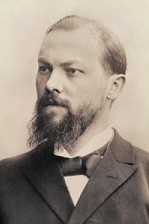Gustav Adolf Deissmann
| Gustav Adolf Deissmann | |
|---|---|
 | |
| Nascimento | 7 de novembro de 1866 Langenscheid |
| Morte | 5 de abril de 1937 (70 anos) Wünsdorf |
| Cidadania | Reich Alemão |
| Alma mater |
|
| Ocupação | teólogo, professor universitário |
| Empregador(a) | Universidade de Marburgo, Universidade de Heidelberg, Universidade Humboldt de Berlim |
| Religião | luteranismo |
[edite no Wikidata] | |
Gustav Adolf Deissmann (Langenscheid, 7 de novembro de 1866 – Wünsdorf, 5 de abril de 1937) foi um teólogo protestante alemão, melhor conhecido por sua pioneira obra sobre a língua grega utilizada no Novo Testamento, que ele demonstrou ser o koiné, ou a língua comum utilizada no mundo helênico daquele tempo.[1]
Biografia
Deissmann era professor de teologia na Universidade Ruprecht Karl em Heidelberg (1897 - 1908) e depois na Universidade Friedrich Wilhelms de Berlim (1908 - 1935). Ele foi nominado por duas vezes para o Prêmio Nobel da Paz e tinha oito doutorados honorários em seis países diferentes.[2]
Em 1904 ele fundou, junto com Albrecht Dieterich, um círculo de eruditos chamado Eranos, em Heidelberg. Entre os membros estavam Ernst Troeltsch, Max Weber, Eberhard Gothein, Georg Jellinek, Karl Rathgen e Wilhelm Windelband.[3]
Em Berlim, o foco acadêmico de Deissman começou a mudar da filologia grega para o movimento ecumênico, a reforma da igreja e, significativamente, a Völkerverständigung internacional (um entendimento mútuo entre as nações e culturas com o objetivo de promover a paz). Entre 1914 e 1922 ele produziu um comuniqué semi-político internacional, o Evangelischer Wochenbrief, juntamente com o seu equivalente inglês, o Protestant Weekly Letters (1914-1917). Sua audiência era primordialmente os cristãos influentes na Alemanha e nos Estados Unidos e ambos proveram um fórum para fomentar o avanço da paz e a compreensão entre as nações.[4]
Em 1925, Deissman tomou conhecimento da desintegração da antiga Éfeso, um importante sítio arqueológico, parcialmente escavado antes da Primeira Guerra Mundial sob os auspícios do Instituto Arqueológico da Áustria. Deissman fez campanha sozinho por muitos anos, tanto a nível nacional quanto internacional, para aumentar o conhecimento geral sobre o destino de Éfeso e conseguiu juntar fundos para que o trabalho arqueológico fosse retomado em 1926 e continuasse anualmente até 1929.[5]
Deissman morreu em 5 de abril de 1937, em Wünsdorf, perto de Berlim, onde está enterrado num cemitério local.
Obras selecionadas
|
|
Referências
- ↑ A. Gerber, 'Gustav Adolf Deissmann (1866-1937): trailblazer in biblical studies, in the archaeology of Ephesus, and in international reconciliation’, Buried History, Journal of the Australian Institute of Archaeology, 41, 2005, pp. 2-3.
- ↑ A. Gerber, Deissmann the Philologist, Berlin, 2010, p. 1.
- ↑ A. Gerber, Deissmann the Philologist, pp. 69-71.
- ↑ A. Gerber, Deissmann the Philologist, pp. 245-281.
- ↑ A. Gerber, ‘Gustav Adolf Deissmann (1866-1937) and the revival of archaeological excavations at Ephesus after the First World War’, Jahresheft des österreichischen archäologischen Institutes, 75, 2006 [2007], pp. 39-46.
Ligações externas
- Friedrich Wilhelm Bautz: Gustav Adolf Deissmann. Em: Biographisch-Bibliographisches Kirchenlexikon (BBKL).
- James Hope Moulton (1914). «Sobre as ideias linguísticas de Deissmann» (em inglês). ABCOG: Christian Living and Literature. Consultado em 1 de junho de 2011
- Deissmann. «Verbete "Hellenistic Greek" em Schaff-Herzog» (em inglês). Biblical Researcher. Consultado em 1 de junho de 2011
Bibliografia
- A. Gerber, Deissmann the Philologist, Berlin, 2010
- C. Markschies, ‘Adolf Deißmann – ein Heidelberger Pionier der Ökumene’, in Zeitschrift für neuere Theologiegeschichte, 12, 2005, pp. 47-88.
- C. Markschies, ‘Adolf Deißmann. Ein Pionier der Ökumene’, in C. Möller, et al., eds., Wegbereiter der Ökumene im 20. Jahrhundert, Göttingen, 2005, pp. 32-53.
- C. Nottmeier, ‘Ein unbekannter Brief Max Webers an Adolf Deißmann’, in Mitteilungen der Ernst-Troeltsch-Gesellschaft, vol. 13, Augsburg, 2000, pp. 99-131.
- C. Nottmeier, ‘Hermann Cohen und Adolf Deißmann: Dokumente aus dem Nachlaß Adolf Deißmanns’, in Zeitschrift für neuere Theologiegeschichte, 9, 2002, pp. 302-25.
- G. Harder / G/ Deissmann, Zum Gedenken an Adolf Deissmann. Vortrag anläßlich des 100. Geburtstages von Adolf Deissmann am 7. November 1966, gehalten am 26. April 1967 vor den Dozenten und Studenten der Kirchlichen Hochschule in Berlin, Bremen, 1967.











